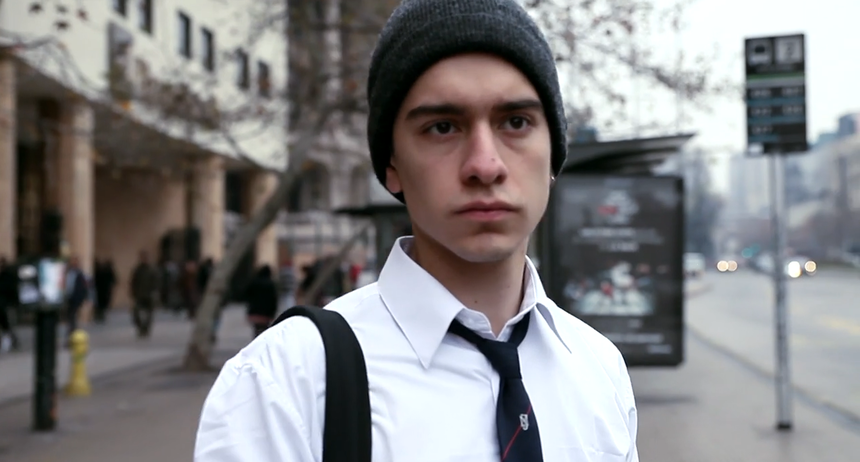FIDOCS 2014 Review: THE WALTZ OF THE USELESS Is An Accurate Chronicle That Lacks Focus

Personally, I think that the sign of a good documentary is when it sets out to "document" something and lays out the facts in the ground in a clear and proper fashion, either it be through interviews, narrations, or whatever media available. It makes it available to everyone, it tries to make it clear to anyone in the world what the subject is. The better documentary comes when those facts, or whatever the subject that the film is portraying, is laid out in a creative fashion, thus having a way of distancing itself from the television way of making documentaries, and thus the ways and creative implements available for this are practically infinite.
Now, the Great Documentary is the one that manages to have all that I've said so far, but at the same time, it has a Perspective, a Point of View, something that must be fundamental to a filmmaker when he sets out to make a film (specially a documentary) but more than ever, it's the feature that most of the time seems to fail or just be missing. So, why am I saying all this? Because the subject matter, the way that it was filmed and how it's presented, The Waltz of The Useless, aims to be seen and regarded as a Great and Important Documentary, but it's not, it's just a good one.
In 2011 there were student protests all over Chile, from kids and youngster from schools and universities, and I was one student among all of them, wanting a better education: yelling and rallying in the streets, we weren't exactly apolitical, but we knew that we couldn't trust any organization or party of any kind if we wanted to be taken seriously. We wanted a free and public education for everyone, and we weren't going to stop until we got it.
Of course, we stopped, the tedium of seeing an unresponsive government turned many of us off, and even if today there are many schools and universities that try to revive the movement, it's not going to compare to the strength and massive appeal as well as international repercussion that the 2011 protests had in the world, and more essentially, in the everyday political life, as to right now three of the leaders of the cause are now in Senate, and there's an education reform in discussion right now.
So, if you can understand, it's an important subject to me, and I want it to be treated well. And this movie wants to be something that tries to capture it in an emotive way, it manages to create the sensation of what it was, but it fails to give it context or any depth.
The other element of this film is that it features two protagonists: a high-school student of the most important public school in Santiago, Chile (The Instituto Nacional), that I also attended, and a tennis teacher who was tortured during the Augusto Pinochet's dictatorship. Now, they are obviously distinct characters that may give a way of contrast or giving different perspectives on the subject, but in the end they are both mostly useless to anything that ever was important about what happened in 2011.
It's important and highly emotive to hear this now old man relate the way he was taken away and then tortured by the military, but it has absolutely no connection to anything that is going on in the streets. If it wanted to make a comparison with what happened with the police and its attitude towards children and young people in general when it came to the protests, it doesn't come through or it just doesn't dare to make the direct connection.
The kid just barely involves himself in the process. We see him in some streets, trying to contact some friends through his cellphone, looking at the police barricading the students, trying to hold the hordes that will later try to ask for a permission to run through the main avenue to ask for their right to be educated. But we don't see him as an important man in the process, and one can guess that it was the point of the film, but it doesn't come through as a point of view.
In a way, the film is a good documentary, and I can end up recommending it to anyone who hasn't lived or knew how the process went down in Chile, as I said before, it lays out the facts and how it may feel to be there. But the way that it chooses to have two protagonists, and have both of them have practically no connection to the protests or the process itself, is no creative nor bold nor anything, it's merely a distraction and not much else. It aims for depth, but it comes out empty.
And the film has a severe lack of Point of View towards its subject. Not because it maybe has an opinion on the whole revolution (as it was once called), but it doesn't equate to a formed direction nor a way that the shots, the information and the speeches are chosen, it just seems that they had to work around what they shot, and while there are many inspired, informative and at times funny moments, they just seem like a mixture of everything.
I may seem furious towards this movie, and I'm really not, but I'm more disappointed that it doesn't achieve the greatness that it sets out to be in posters, trailers and even in its first shot. But if it ever comes out of this country, it's a good document of part of what happened, let's hope for more.







